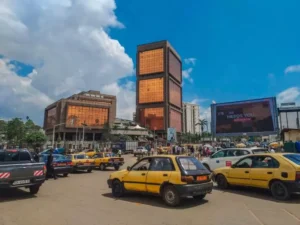Physical Address
304 North Cardinal St.
Dorchester Center, MA 02124
Physical Address
304 North Cardinal St.
Dorchester Center, MA 02124
Digital commerce may be entering a new phase of confidence and size as the Central Bank approved.

The newly acquired payment-service licence by Flutterwave in the Bank of Central African States does much more than checking a compliance box, and instead, it virtually reduces the psychological threshold to digital transactions by 28 million Cameroonians and thousands more cross-border sellers. The seal of quality is coming as mobile-money activity already contributes more than 5 % to the country import GDP and the amount of adults using mobile-money has jumped to well over 42 % in the last five years, more than any other CEMAC countries have succeeded in doing. Putting itself into the market as one of the few completely authorised fintechs, Flutterwave is already telling potential investors that the regulatory environment in Cameroon is no longer apprehensively testing matters in pilot mode, but working to do so in an appropriately scaled manner, much like it did in Kenya, following formalised regulation of M-Pesa in 2014. (GSMA, 2025)
Its licence transformation into a fast regional train network is made by the technical partnership with the Ecobank. The presence of Flutterwave in Africa through its 200 plus branches of Ecobank provides the company with feet on the street when it comes to KYC, liquidity and cash-out and the use of ISO 20022 messaging between both organizations reduces settlement lag time significantly. This is a big difference: according to recent AfricaNenda research, clearing cross-border payments 40 % faster on average, fintechs have a banking-grade host partner. With this infrastructure built out, Flutterwave can build-test-build products such as pay-by-link, split payouts, subscription billing, and the compliance negotiation process does not need to be renegotiated, a structural advantage that will be highly appealing to the venture capital pouring into African payments (McKinsey, 2024).
To the merchants of Cameroon the value offering is tangible:
All these individually minor micro-efficiencies add up to margin increases of over 10 % to SMEs who had been losing as much as 7 % of their turnover in cash-handling leakage. The upside of this lies in the fact that of every hundred million people who see a finish on your forecast, one whom you innovate will take their picture and put it to the test. It will be put in place as a result of FinTech Global adopting it as the strategy it will follow (FinTech Global, 2025).
The mobile-money and card-rail patchwork has scared away large platforms that have been looking at Central Africa. The fragmentation is solved by the licence of Flutterwave: one API connects to 95 % of active wallets in Cameroon and integrated with pan-African pays-out corridors. Streaming services will be able to charge in CFA and make settlement in USD; e-commerce giants will be able to do on-demand refunds in local currency, features that have to date necessitated at least three independent connections. Since transaction data reflect this macro-impact it can be seen:
| Country | Transactions Share (%) | Value Share (%) | Volume (billion) | Value (CFA bn) |
|---|---|---|---|---|
| Papua new guinea | 12 | 12 | 1.0 | 1 460 |
| Congo | 15 | – | 0.364 | – |
| Gabon | 15 | 15 | 16 | 16 164 |
BeAC, 2024
Cameroon: The destination of choice in Central African trade Chief executive officer Olugbenga GB Agboola already refers to Cameroon as the linchpin of Central African trade, predicting that friction-free low-cost payment will open up slumbering trade flows between the Gulf of Guinea and the Sahel. His talk is followed by action: Flutterwave has set aside capacity-building grants to dev-shops in the region, helping them create vertical apps on its APIs, as it did with its accelerator programme in Nigeria which produced two YC-funded startups last year. Through developing an ecosystem and not just a payment button, the firm is able to present itself as a long-term development engine and not a temporary processor. (FinTech Global, 2025)
According to Senior VP Bode Aregbesola, the cash-dense market of Cameroon today bears striking resemblance to that of Nigeria in 2018, ready to swiftly be converted into online in case users can enjoy rock-solid trust and availability. Therefore, the Flutterwave proactively implements its AI-based risk engine (which already prevents 0.23 % of fraudulent attempts in 30 African markets) along with 99.95 % availability SLAs when used by enterprise customers. The region has poor track records of such guarantees but multinationals are calling them more often. As the revenues in African fintech are forecasted to grow by over fourfold within the next five years, the costs of letting the operational excellence slip are higher than ever before. The prediction by the McKinsey indicates that those companies that obtain the early regional licences may enjoy disproportionate market share once the revenue wave high is achieved. To combat the attack, we will learn more about the enemy, where they currently feel absolutely secure (McKinsey & Company, 2024).
Author Bio Samuel Adebayo is a fintech analyst and ex-payment-systems engineer who unravels the African digital-finance transformation, in the view of international investors. He combines interviews of on-the-ground merchants with macro-economic modelling to determine the interconnections between profits and inclusion.